Illustrated
Larger Sutra
(34-40)
Illustrations from the Larger Sutra Mandala
| Admonition against five evils: |
[34] The Buddha said to Maitreya, "If
here in this world you are upright in thought
and will, and abstain from doing evil, then
you will attain the utmost virtue, unsurpassed
in all the lands throughout the ten quarters.
Why is this so? Devas and humans in the Buddha-lands
naturally do good and rarely commit evil,
and so, it is easy to teach and train them.
Having become a Buddha in this world, I now
dwell in the midst of the five evils, the
five sufferings, and the five burnings. This
is extremely painful for me. I will teach
multitudes of beings, making them abandon
the five evils, avoid the five sufferings,
and escape from the five burnings. I will
train their minds and lead them to practice the
five good deeds, so that they may acquire
merit and virtue and attain emancipation,
long life, and Nirvana."
"The Buddha continued, What are the
five evils? What are the five sufferings?
What are the five burnings? What is the way
to extinguish the five evils and lead people
to practice the five good deeds, so
that they may acquire merit and virtue and
attain emancipation, long life, and Nirvana?"
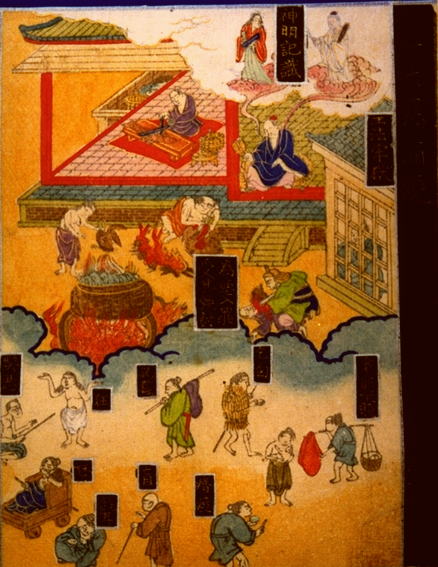
Five great evils - 1 |
[35] The Buddha said, "The first evil
is this. Devas, humans and lesser beings,
including even those that crawl, are bent
on doing evil. There is no being that is
not. The strong subdue the weak; all inflict
serious injuries and kill each other, all
devour their prey. Not knowing how to do
good, they commit evil and do outrageous
and unruly deeds. Later, they receive
retribution, [276a] it is natural that they
should be destined to evil realms. Demigods
keep records of offenders' acts and make
sure that they are punished. That is why
some are poor and destitute, corrupt, beggarly,
lonely, deaf, dumb, blind, stupid, wicked,
physically handicapped, deranged, or subnormal.
But others are honorable, noble, wealthy,
intelligent, or clever. This is the result
of good and meritorious acts of benevolence
and the performance of their duties to their
parents in past lives.
"In this world prisons are set up by
the law, and those who are unafraid of them
and commit offenses are sent there for
punishment. However desperately they may
wish to escape, it is impossible to do so.
Such is retribution in this world, but in
the lives to come, punishment is longer and
more severe for such evildoers. The suffering
of transmigration through dark and dismal
realms is comparable to the severest and
most painful punishment ever enforced by
law.
"Thus, through the natural working of
karma, they undergo immeasurable suffering
in the three evil realms. In successive transmigrations
they are reborn into different forms; their
life-spans are sometimes long and sometimes
short. Their transient selves, vital energy
and consciousness transmigrate through the
natural working of karma. Although each individual
is reborn alone, those bound by common karma
come to be born together and take revenge
upon each other. So this condition persists
endlessly and, until the effect of their
evil karma is exhausted, there is no possibility of
avoiding their enemies. Floundering in Samsara,
they have no chance of escape or of attaining
emancipation. The pain that they must undergo
is indescribable. Since this law naturally
obtains everywhere between heaven and earth,
even if good or evil acts do not immediately
bring about reward or retribution, they will
certainly result sooner or later. This I
call the first great evil, the first suffering,
and the first burning. Those afflictions
are such that they are comparable to a huge
fire burning people alive.
"If in the midst of this, one controls
one's thoughts with single-mindedness, does
worthy deeds with proper demeanor, commits
no evil, and performs only good, then with
the merit and virtue acquired one reaches
emancipation and is able to escape from this
world, be reborn in heavenly realms, and
finally reach Nirvana. This is the first
great good."
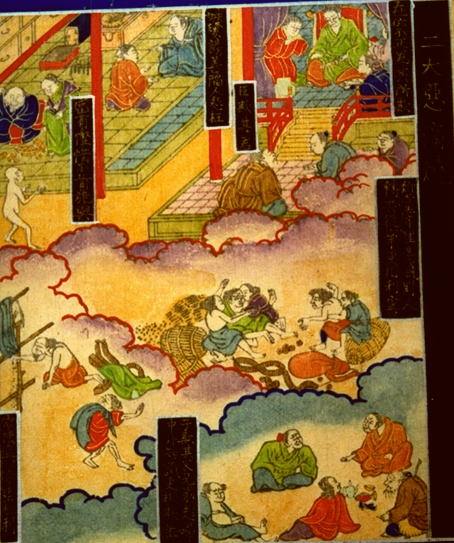 Five great evils - 2 Five great evils - 2 |
[36] The Buddha continued, "The second
evil is that people of the world -- parents,
children, brothers and sisters, members of
a family, husbands and wives -- all lack
moral principles, break laws, conduct themselves
arrogantly, commit licentious and unruly
acts, pursue their own pleasures, enjoy themselves
as they will, and deceive each other. What
they think contradicts what they say; they
speak without sincerity, flatter others with
deceitful intention, fawn upon others with
artful words, envy the reputation of sages,
abuse the virtuous, and entrap people by
dishonest means.
"Masters are unwise in appointing retainers,
who, exploiting the situation, seek every
opportunity for trickery and deceit. Rulers,
being unrighteous, are deceived by ministers
and foolishly remove loyal and faithful subjects.
This is contrary to the will of Heaven. Ministers
betray their rulers; children deceive their
parents; brothers, sisters, husbands, wives,
kinsmen and friends deceive each other. They
harbor greed, anger, and stupidity,
and, desiring many possessions, seek their
own advantage. All people are the same at
heart, whether they are men of high and honorable
positions or of lower and despised classes.
They bring their homes and themselves to
ruin and recklessly destroy their kindred.
Although there are family members, friends,
villagers, townspeople, ignorant [276b] and
vulgar groups working together, all seek
to gain their own profit, thereby incurring
the anger and enmity of others. When people
grow rich, they become miserly and uncharitable.
Greedily attached to their wealth, they toil
with mind and body to retain it. When their
end comes, they find nothing to rely on.
Ultimately they are born and depart alone,
with nobody to accompany them. Bliss or misery
resulting from good or evil acts follows
them in their future lives. Thus they are
reborn in pleasant or painful states. Even
if they later show regret, what good will
that do?
"People of the world, being dark-hearted
and lacking insight, hate and abuse good
people and show them no respect. They are
attached to wrongdoing and willfully commit
unlawful acts. They always covet the wealth
of others and harbor intentions of stealing.
After spending and squandering what they
have robbed from others, they seek to regain
it. Because of their own hidden motives and
dishonesty, they slyly study the reactions
shown on the faces of others. Since they
are unable to think far ahead, when things
go wrong, they become despondent with chagrin.
"In this world there are prisons established
by the law where offenders are sent to receive
punishment according to their offenses. In
their previous lives they neither believed
in the Way nor cultivated roots of virtue.
In this life, too, if they commit evil, demigods
know and keep records of their acts; when
they die, they fall into evil realms. Thus,
because of the natural working of karma,
there are the three evil realms and innumerable
sufferings through which evildoers must pass,
life after life, for many kalpas, with no
end in sight. It is indeed difficult for
them to attain release. The pain they must
undergo is indescribable. This is called
the second great evil, the second suffering,
and the second burning. The afflictions are
such that they are comparable to a huge fire
burning people alive.
"If in the midst of this one controls
one's thoughts with single-mindedness, does
worthy deeds with proper demeanor, commits
no evil, and performs only good, then with
the merit and virtue acquired one reaches
emancipation and is able to escape from this
world, be reborn in heavenly realms and finally
reach Nirvana. This is the second great good."
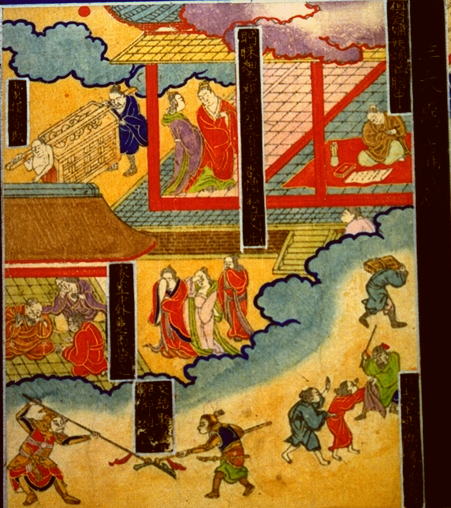 Five great evils - 3 Five great evils - 3 |
[37] The Buddha continued, "The third
evil is this. People of the world live together,
inhabiting this realm between heaven and
earth, with a limited life-span. On the one
hand, among the higher levels there are wise,
rich, honorable, noble, and wealthy people.
On the other hand, among the lower levels
there are people who are poor, debased, crude
and foolish. Besides, there are evildoers
who always harbor vicious thoughts and
think only of self-gratification; they are
full of worries, sunk in lust and attachment,
are restless in their daily lives, greedy
and miserly, and desirous of what they have
no right to possess. They gloat over fair-skinned
women, behave licentiously and commit obscene
acts with them, hate their own wives, and
secretly frequent brothels. Consequently,
after squandering all their resources, they
begin to break the law. They form bands,
start riots, engage in fighting, unlawfully
attack and kill people and plunder property.
"Some have evil designs on the possessions
of others. Without working at their own occupations,
they acquire things through theft. Driven
by desire, they commit further offenses.
Feverishly agitated, they intimidate and
rob people to support their own wives and
children with the goods thus acquired. Obeying
only the dictates of their passions, they
become addicted to wanton pleasures. They
also disregard seniority in kinship, causing
sorrow and anguish to other family members
and relatives; furthermore, they take no
account of the laws of the State.
"But such evils are known to others
and also to demons. The Sun and the Moon
recognize them and demigods [276c] keep records
of their doings. Thus, because of the natural
working of karma, there are three evil realms
and innumerable sufferings through which
evildoers must pass, life after life, for
many kalpas, with no end in sight. It is
indeed difficult for them to gain release.
The pain they must undergo is indescribable.
This is called the third great evil, the
third suffering, and the third burning. The
afflictions are such that they are comparable
to a huge fire burning people alive.
"If in the midst of this one controls
one's thoughts with single-mindedness, does
worthy deeds with proper demeanor, commits
no evil, and performs only good, then with
the merit and virtue acquired one reaches
emancipation and is able to escape from this
world, be reborn in heavenly realms and finally
reach Nirvana. This is the third great good."
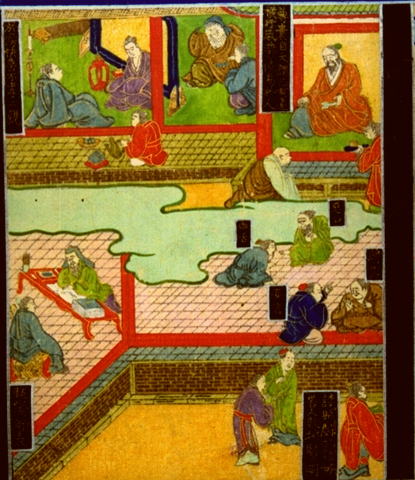
Five great evils - 4 |
[38] The Buddha continued, "The fourth
evil is this. People of the world do not
think of doing good. They incite each other
to commit various kinds of evil -- uttering
harsh and abusive words, telling lies, and
engaging in idle talk. They slander others
and cause contention. They hate and envy
good men and ruin the wise, while they rejoice
in watching this behind the scenes. They
are neglectful of their parents, make light
of their teachers and elders, fail to win
the trust of their friends, and lack sincerity.
Holding themselves in high esteem, they think
that they are virtuous, but act waywardly
in an overbearing manner and despise others.
Unaware of their own evil, they never feel
ashamed of themselves. Boastful of their
physical strength, they demand respect and
fear from others. Taking no heed of Heaven,
Earth, demigods, or the Sun and the Moon,
they disdain to do any good. So they are
difficult to train and convert. Holding themselves
in high esteem, they demand their own way.
Arrogant and afraid of nothing, they always
assume a haughty attitude. But demigods keep
record of their evils. Perhaps there was
some meritorious act in their past lives,
and they can count on the effect of that
small amount of good. But, since they commit
evil again in this life, their stock of merit
is soon exhausted; good divinities forsake
them, leaving them alone and with no one
on whom to depend. When their lives end,
all their evil recoils upon them and forces
them, through the natural working of karma,
to descend to the evil realms. Again, as
the exact record of their deeds in the hands
of the demigods dictates, their karmic transgressions
and offenses condemn them to hellish
realm. Retribution for evil comes about naturally
and nothing can stop it. They must go into
the red-hot cauldrons, where their bodies
are melted down with the utmost torment and
anguish. Even if at that time they repent
of their evil deeds, what good will that
do? The Way of Heaven takes its inevitable
course without mistake.
"Thus, because of the natural working
of karma, there are the three evil realms
and innumerable kinds of suffering through
which evildoers must pass, life after life,
for many kalpas, with no end in sight. It
is indeed difficult for them to gain release,
and the pain they must undergo is indescribable.
This is called the fourth great evil, the
fourth suffering, and the fourth burning.
The afflictions are such that they are comparable
to a huge fire burning people alive.
"If, in the midst of this, one controls
one's thoughts with single-mindedness, does
worthy deeds with proper demeanor, commits
no evil, and performs only good, then with
the merit and virtue acquired one reaches
emancipation and is able to escape from this
world, be reborn in heavenly realms, and
finally reach Nirvana. This is the fourth
great good." [277a]
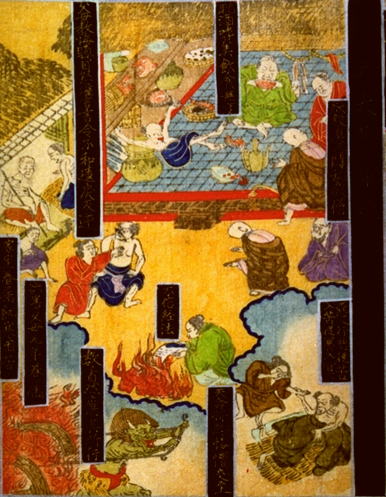 Five great evils - 5 Five great evils - 5 |
[39] The Buddha continued, "The fifth
evil is this. People of the world are indecisive
and slothful, reluctant to do good, lacking
in self-discipline and not working hard at
their occupations, so their families and
dependents are left to suffer from hunger
and cold. When reproached by their parents,
they retort angrily with scornful looks.
With such conflicts they are far from peaceful;
they can be as violent and frenzied as enemies
confronting each other, and, as a result,
parents wish that they had no children.
"In dealing with others, they are licentious
and wayward, causing trouble and annoyance
to many. Even when they are morally obliged
to others, they neglect their duties and
have no intention of repaying their indebtedness.
Destitute and driven to the most desperate
ends, they have no way of regaining their
wealth. Although eager to obtain much profit
and appropriate the riches of others, they
waste their money on wanton pleasures.
As this becomes a habit, they grow accustomed
to acquiring property illegally and to spending
their ill-gained profits on personal luxuries;
indulging in wine and sumptuous food, they
eat and drink to excess. Profligate and contentious
as they are, they engage in foolish quarrels.
Unable to understand others, they forcibly
impose their will upon them.
"When they come upon people who are
good, they hate and abuse them. Lacking ethics
and decorum, they do not reflect on their
conduct, and so are presumptuous and insistent,
refusing to take the advice and admonitions
of others. They are unconcerned if their
kinsmen, from the closest to the sixth blood-relative,
have no means of livelihood. They disregard
their parents' benevolence, and do not fulfill obligations
to their teachers and friends. They think
only of doing evil; their mouths continuously
speak malice; and with their bodies, they
are forever committing evil. In their whole
lives they have not done even one good deed.
"Furthermore, they do not believe in
the ancient sages, nor the Buddhist teachings,
nor the path of practice leading to emancipation.
Neither do they believe that after death
one is reborn into another state of existence,
that good deeds bring about good rewards,
or that evil acts bring about evil consequences.
They plot to murder an arhat, to cause disruption
in the Sangha, and even think of killing
their parents, brothers, sisters or other
relatives. For this reason, even their kinsmen,
from the closest to the sixth blood-relative,
hate them so much as to wish them dead.
"Such people of the world are all of
the same mind. They are foolish and ignorant,
lacking the wisdom to know whence they have
come into life nor whither they are going
after death. Neither humane toward others
nor obedient to their elders, they revel
against the whole world. Nevertheless, they
expect good fortune and seek long lives,
only to meet death in the end. Even if someone
compassionately admonishes them, trying to
lead them to thoughts of goodness, and teaches
them that naturally there are good and evil
realms of Samsara, they will not believe
him. However hard one may try to persuade
them, it is useless. Their minds are closed,
and they refuse to listen to others or understand
their teachings. When their lives are about
to end, fear and revulsion arise in turn.
Not having previously done any good, they
are filled with remorse when they come to
their end. But what good will that do then?
"Between heaven and earth, the five
realms are clearly distinguishable. They
are vast and deep, extending boundlessly.
In return for good or evil deeds, bliss or
misery ensues. The result of one's karma
must be borne by oneself alone and no one
else can take one's place. This is the natural
law. Misfortune follows evil deeds as their
retribution, which is impossible to avoid.
Good people do good deeds, and so enjoy pleasure
after pleasure and proceed from light to
greater light. Evildoers commit crimes, and
so suffer pain after pain and wander from
darkness to deeper darkness. No one, except
the Buddha, knows this completely. Even though
someone admonishes and teaches them, very
few believe; and so the cycles of birth-and-death
never cease and the evil paths continue endlessly.
[277b] The karmic consequences for such worldly
people are beyond description in detail.
"Thus, because of the natural working
of karma, there are innumerable kinds of
suffering in the three evil realms through
which evil beings must pass, life after life,
for many kalpas, with no end in sight. It
is indeed difficult for them to gain release,
and the pain they must undergo is indescribable.
This is called the fifth great evil, the
fifth suffering, and the fifth burning. The
afflictions are such that they are comparable
to a huge fire burning people alive.
"If in the midst of this, one controls
one's thoughts with single-mindedness, does
worthy deeds with proper demeanor, mindfully
recollects, harmonizes words and deeds, acts
with sincerity, utters true words, speaks
from the heart, commits no evil, and performs
only good, then with the merit and virtue
acquired one reaches emancipation and is
able to escape from this world, be reborn
in heavenly realms, and finally reach Nirvana.
This is the fifth great good."
| Further admonition by the Buddha |
[40] The Buddha said to Maitreya, "I
shall explain further. Such are the afflictions
of the five evils in this world. The five
sufferings and the five burnings continue
to arise from them. People commit nothing
but evil and fail to cultivate roots of virtue,
and so it is natural that they all go to
evil realms. Even in this life they suffer
from incurable illnesses. Longing for death,
they cannot die; craving for life, they
cannot live. Thus they are an example to
others of what retribution for evil acts
is like. After death, driven by their karma,
they fall into the three evil realms, where
they suffer countless tortures and are themselves consigned
to the flames.
"After a long time they are reborn again
in this world, only to foment hatred against
each other. At first hatred is slight but
finally develops into a major evil. All this
is because of their greedy attachment to
wealth and sensuous pleasures and of their
refusal to share with others. Further, wayward
thoughts arise from the desires born of stupidity.
Their bondage to evil passions will never
be severed. In the pursuit of selfish gain,
there is no chance for them to reflect on
their evils and turn to good. When wealthy
and prosperous, they are happy and do not
learn to be modest and virtuous. Consequently,
their pomp and power are short-lived; when
these are exhausted, they must undergo further
afflictions. Their sufferings are bound to
increase in time to come.
"The law of karma operates like a net
stretched everywhere; in its meshes, it inevitably
catches all offenders. The net woven of large
and small ropes covers the whole world, from
top to bottom, and those caught in it feel
utterly helpless and tremble in fear. This
net has been in existence from of old. How
painful and heart-rending!"
The Buddha said to Maitreya, "People
of this world are as I have described. All
the Buddhas pity them and with divine powers
destroy their evils and lead them all to
goodness. If you give up wrong views, hold
fast to the scriptures and the precepts,
and practice the Way without committing
any fault, then you will finally be able
to attain the path to emancipation and Nirvana."
The Buddha continued, "You and other
devas and humans of the present and people
of future generations, having received the
Buddha's teachings, should reflect upon them
and, while following them, should remain
upright in thought and do virtuous deeds.
Rulers should abide by morality, reign with
beneficence and decree that everyone should
maintain proper conduct, revere the sages,
respect men of virtue, be benevolent and
kind to others, and take care not to disregard
the Buddha's teachings and admonitions. All
should seek emancipation, cut the roots of
Samsara and its various evils, and so aspire
to escape from the paths of immeasurable
sorrow, fear [277c] and pain in the three
evil realms.
"In this world, you should extensively
plant roots of virtue, be benevolent, give
generously, abstain from breaking the precepts,
be patient and diligent, teach people with
sincerity and wisdom, do virtuous deeds,
and practice good. If you strictly observe
the precepts of abstinence with upright thought
and mindfulness even for a day and a night,
the merit acquired will surpass that
of practicing good in the land of Amitayus
for a hundred years. The reason is that in
that Buddha-land of effortless spontaneity
all the inhabitants do good without committing
even a hair's breadth of evil. If in this
world you do good for ten days and nights,
the merit acquired will surpass that of practicing good
in the Buddha-land of other quarters for
a thousand years. The reason is that in the
Buddha-land of other quarters many practice good
and very few commit evil. They are lands
where everything is naturally provided
as a result of one's merit and virtue, and
so no evil is done. But in this world much
evil is committed, and few are provided for
naturally; people must work hard to get what
they want. Since they intend to deceive each
other, their minds are troubled, their bodies
exhausted, and they drink bitterness and
eat hardship. In this way, they are preoccupied
with their toil no have time for rest.
"Out of pity for you and other devas
and humans, I have taken great pains in exhorting
you to do good deeds. I have given you instructions
appropriate to your capacities. You have,
without fail, accepted my teachings and practiced them,
and so have all entered on the Way as you
wished.
"Wherever the Buddha comes to stay,
there is no state, town or village which
is not blessed by his virtues. The whole
country reposes in peace and harmony. The
sun and the moon shine with pure brilliance;
wind rises and rain falls at the right time.
There is no calamity or epidemic, and so
the country becomes wealthy, and its people
enjoy peace. Soldiers and weapons become
useless; and people esteem virtue, practice benevolence
and diligently cultivate courteous modesty."
The Buddha continued, "My concern for
you, devas and humans, is greater than the
care of parents for their children. I have
become a Buddha in this world, destroyed
the five evils, removed the five sufferings,
and extinguished the five burnings. I have
countered evil with good, eradicated the
suffering of birth-and-death, and enabled
people to acquire the five virtues and attain
the peace of unconditioned Nirvana. But after
I have departed from this world, my teaching
will gradually decline and people will fall
prey to flattery and deceit and commit various
evils, resulting in the recurrence of the
five sufferings and the five burnings. As
time goes on, their sufferings will intensify.
As it is impossible to describe this in detail,
I have given you only a brief outline.
The Buddha said to Maitreya, "You should
each ponder on this well, teach and admonish
each other, and be on guard against disobeying
the Buddha's instruction."
The Bodhisattva Maitreya, with his palms
together, said, "O Buddha, how sincere
and earnest your admonition is! People of
the world are just as you have described.
O Tathagata, you take pity on and care for
us without discrimination and seek to deliver
us all from suffering. Having accepted the
Buddha's repeated exhortations, I will be
careful not to disobey them."
 Go to Next File; return to Sukhavati-Index; Index
Go to Next File; return to Sukhavati-Index; Index


 Five great evils - 2
Five great evils - 2 Five great evils - 3
Five great evils - 3
 Five great evils - 5
Five great evils - 5Go to Next File; return to Sukhavati-Index; Index